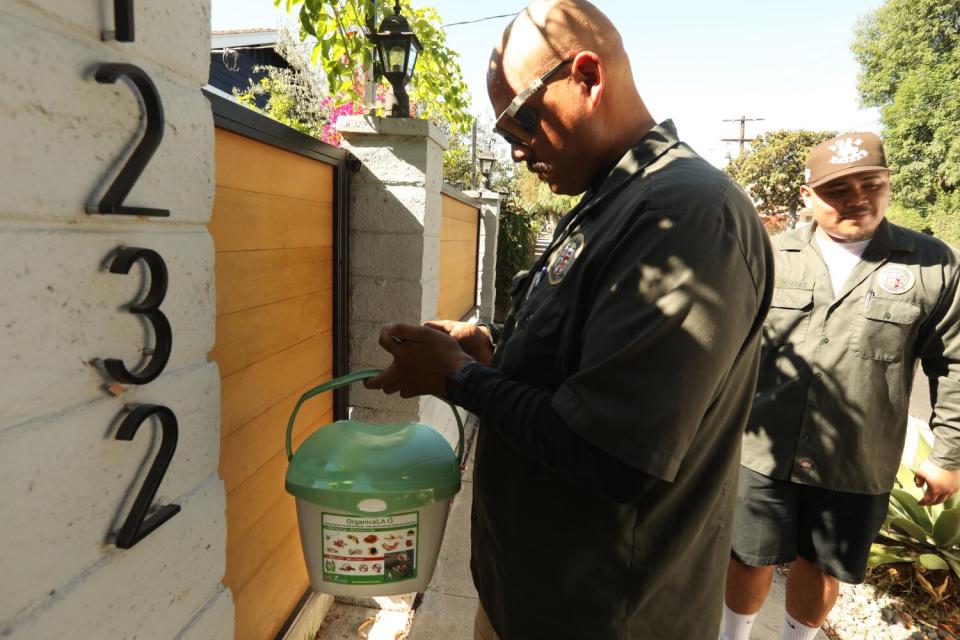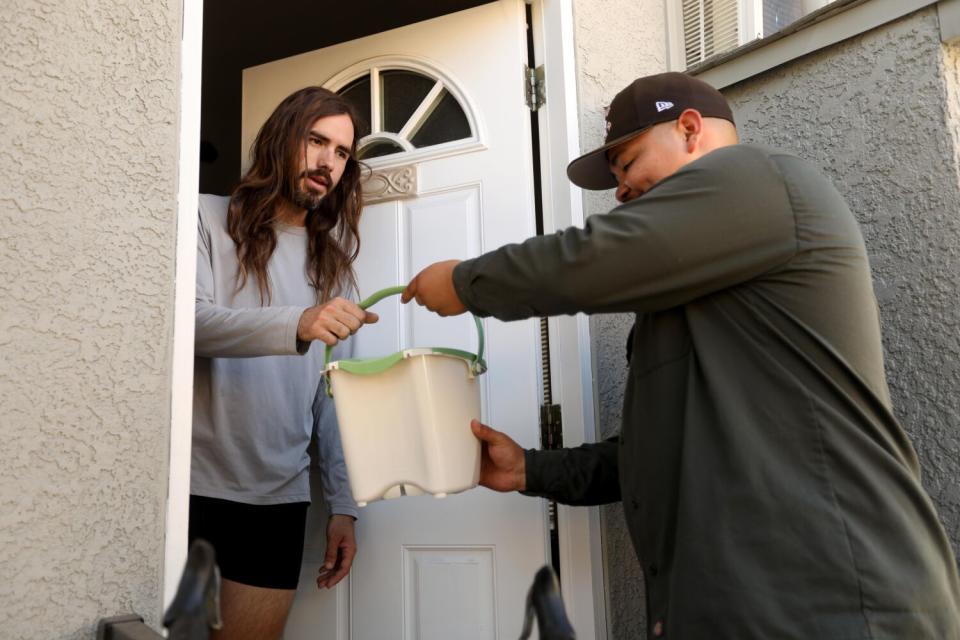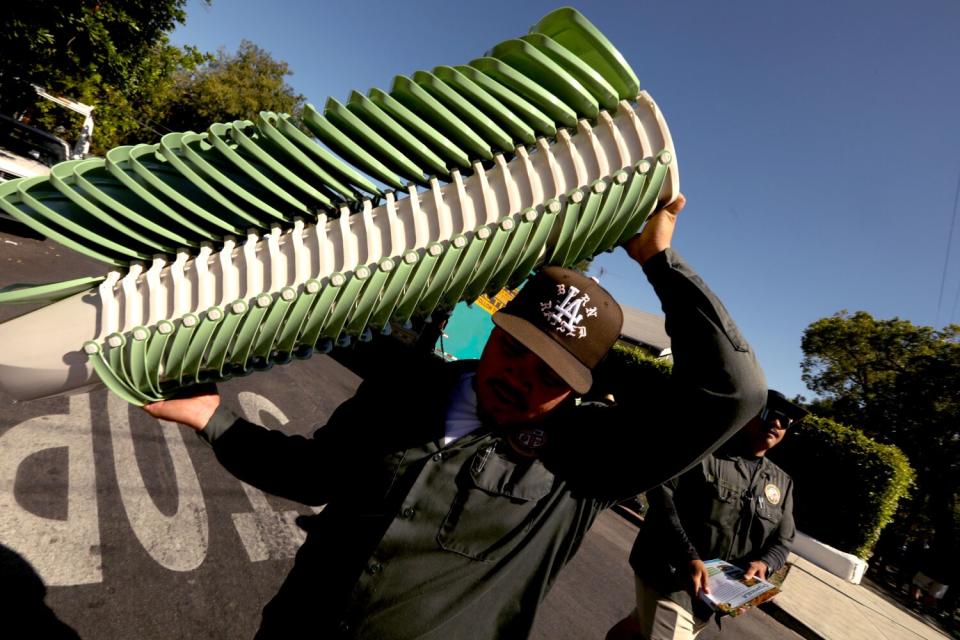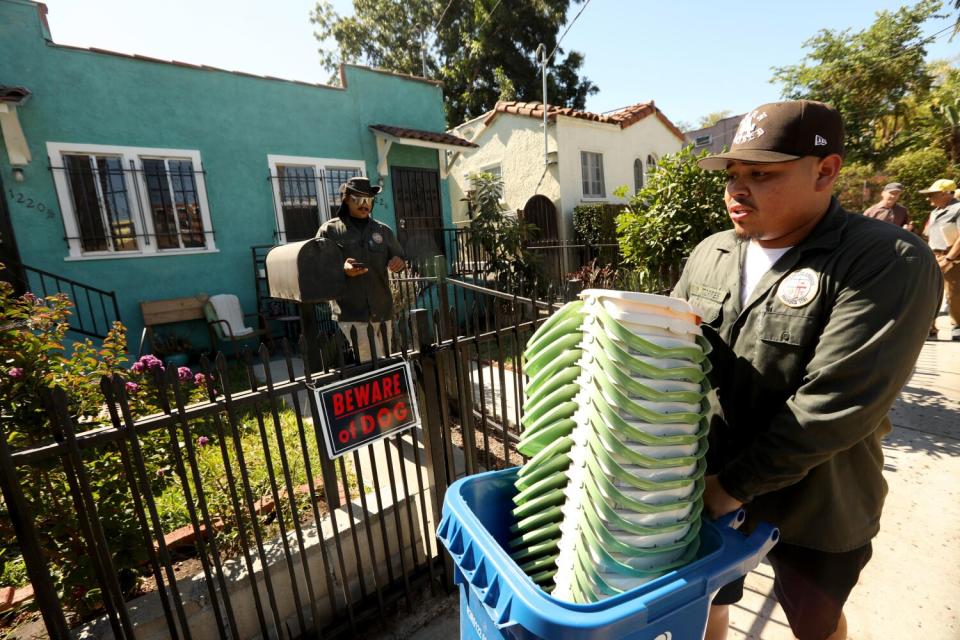L.A. is finally separating food waste from trash. Will residents embrace composting?

For all the smiles and goodwill they attracted on a recent morning, the workers in the big green truck might have been hawking Popsicles and Choco Tacos. But on this hot Saturday near downtown, the people of Los Angeles were showering their love not on the ice cream man, but the trash man.
The reason: L.A. Sanitation & Environment employees were delivering composting pails to every home and apartment in the Sunset Junction neighborhood west of Dodger Stadium. If all goes as planned, the expansion of this program will allow every Angeleno to conveniently recycle kitchen scraps, thereby reducing the burden on landfills and helping stem the production of Earth-warming greenhouse gases.
“I’m really excited,” said Frankie McLafferty, a freelance web producer, accepting a toaster-sized composting pail at her front door. Until recently, she had seen composting as an "inaccessible" goal, requiring a big yard and her own equipment. Not anymore.
"I’d rather do something for the environment. Now I feel I can."

McLafferty will be one of the early adopters now that Los Angeles has rolled out its curbside composting program to an initial group of 40,000 homes. The program encourages residents to deposit coffee grounds, egg shells, moldy bread, spoiled fruit, uneaten lasagna and all manner of other kitchen leftovers to the green waste bins where they already dump their yard trimmings.
All of this may sound routine to many Bay Area and Orange County residents who have participated in residential composting programs for years. But because of its vast scale, Los Angeles could have a transformational effect on diverting food waste, experts say.
Los Angeles isn't advancing this environmental cause on its own. It is scrambling to meet a state-mandated deadline to move food waste out of landfills by the end of the year. To make the program available to all 750,000 of L.A.’s households, the city must build the capacity to handle a huge wave of organic waste, eventually up to 3,000 tons a day.
“We are trying to return to a future where everyone is more considerate of how they use water and other natural resources,” said Barbara Romero, director of L.A. Sanitation & Environment. “It requires a behavior change, but I think everyone wants to be part of the solution. We are going to do our part, but we need the public as our partners.”

L.A. lags behind other cities in accommodating an at-home option for residents to divert food waste. San Francisco offered green bin disposal of kitchen scraps starting more than a decade ago. Many smaller cities have followed suit.
“I would be lying if I told you I wasn’t a bit disappointed to see a city that has always positioned itself as an environmental champion being a laggard in terms of rolling out this program,” said Nick Lapis, director of advocacy for Californians Against Waste. “Especially given how important it is to quickly reduce methane emissions to protect us from the most dire impacts of climate change.”
Burbank, South Pasadena and Glendale are among the cities in Los Angeles County that have curbside food scrap pickup already in place. So do Newport Beach, San Clemente and Dana Point in Orange County.
“I question why the city of L.A., being a climate leader in the region, is lagging behind conservative coastal Orange County cities,” said Hoiyin Ip, co-chair of Sierra Club California’s Zero Waste Committee.
L.A. sanitation officials said the city has taken longer to start the program because it simply has much more green waste to process than other cities. With 4 million residents, L.A.'s population is more than four times larger than San Francisco. And largely because of its bigger yards, its 3,000-ton-a-day estimated green waste production is six times greater than its northern neighbor.
“L.A. is in a league of its own as a city of 4 million people,” said Alex Helou, assistant director of L.A. Sanitation & Environment. “They don’t have yard waste in the volume we do. If you look at the total, we have to deal with significantly more material.”
All this material means that Los Angeles will have to build additional processing facilities to make compost or use alternative technologies, like anaerobic digestion, to create biogas.

For now, L.A. Sanitation & Environment trucks deliver the contents of green bins to transfer stations, where the yard clippings and kitchen leftovers get loaded onto 18-wheelers that can carry as much as 20 tons of green waste. The trucks deliver the organics to Blossom Valley Organics South, a 485-acre composting facility in Lamont, just east of the junction of Interstate 5 and State Route 99.
The facility, run by waste management company Recology, is a 113-mile drive from downtown Los Angeles. Most of the nutrient-rich end product will be sold as a soil amendment to small- and medium-sized farms in Kern County. Many of the farms grow almonds and table grapes.
Food waste became a preoccupation of environmentalists, lawmakers and state regulators after studies showed that landfills are the biggest “point source” of methane. Point sources are single-location producers of pollution, contrasted with multipoint generators such as cars and trucks. While much less prevalent than carbon dioxide, regulators have focused on methane because its global warming potential is more than 80 times greater.
Then-Gov. Jerry Brown signed Senate Bill 1383 in 2016 to force cities and counties to launch programs to get methane-producing food waste out of landfills. Studies have shown that material that decomposes more gradually can reduce emissions, particularly when it is applied to farmland, where plants and trees sink carbon back into the soil. A follow-up law gives local governments until next year to put alternative disposal programs in place.
Los Angeles launched an experimental program for separate processing of food waste in 2008 but didn’t begin to seriously expand the effort until 2018, when 18,000 households in pilot neighborhoods citywide were allowed to throw food waste into their green refuse bins. The pilot expanded this summer with the addition of 22,000 homes in the north-central end of the city, to reach a total of 40,000 homes.

Los Angeles sanitation officials said they plan to add other processing centers by this fall. They are hoping some of the alternatives will be closer to the city, reducing the need for fossil fuel-burning trucks to complete the 200-plus-mile round-trip to Lamont (though city officials note that natural gas-burning Recology trucks are less polluting than standard-fuel vehicles).
Angelenos currently dispose of about 1,700 tons of organic material a day via their green bins, most of which is yard trimmings. With the addition of food waste and more rigorous attention to how refuse is separated, L.A. Sanitation & Environment officials are projecting the green waste stream could grow to as much as 3,000 tons a day, available for reprocessing into compost or other products.
Homeowners are also free to compost in their own yards. Dori Atlantis, an artist in the Sunset Junction area, told the city compost pail distributors that she has been making her own compost for decades and using it to nourish her nectarine, lemon and orange trees, along with a newer passion fruit vine.
“When I moved in, my soil was horrible,” Atlantis said. “It was just hard and just bad. It hadn’t been taken care of. With compost, it came back to life.”
Before the L.A. kitchen waste pickups go citywide, residents also have the option of dropping food waste at farmers markets. The service is available at markets in Atwater Village (Sunday), Highland Park (Tuesday), Los Angeles State Historic Park, near Chinatown (Thursday), and Wellington Square in Mid-City (Sunday). Drop-offs will soon be accepted at additional farmers markets in Crenshaw, Playa Vista, Central Avenue and Pershing Square.
The vast majority of the Sunset Junction residents greeted L.A. sanitation workers with open arms earlier this month. Tech worker Abi Bock told the workers that her search for a composting solution helped her reconnect with an acquaintance from New York City; the two have since become fast friends.
“It feels good to be doing something positive,” Bock said. “And now it helps that the city is going to help you do it. It will make it more part of the routine.”

Less than 2% of households offered the green-topped recycling pails have turned them down, the city said.
On a recent weekend, only one Sunset Junction home turned away sanitation workers bearing a pail. “We’re good,” a young man called out from his front porch.
Asked a few minutes later why they hadn’t accepted a compost pail, the man’s teary-eyed companion explained: “We were just in the middle of breaking up.”
But, she quickly added: “I'm from San Francisco. I really do love to compost.”
This story originally appeared in Los Angeles Times.
